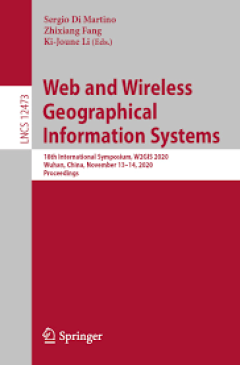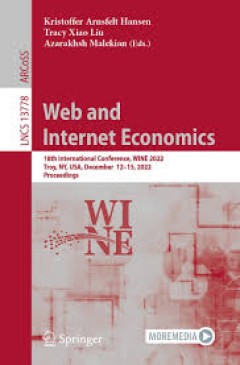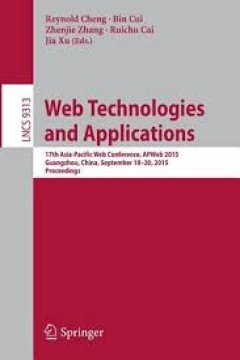Filter by

Web and Wireless Geographical Information Systems 14th International Symposi…
This book constitutes the refereed conference proceedings of the 14th International Symposium, W2GIS 2015, held in Grenoble, France, in May 2015. The 12 revised full papers presented were carefully selected from 19 submissions. Selected papers cover hot topics related to W2GIS including spatiotemporal data collection, processing and visualization, mobile user generated content, semantic trajec…
- Edition
- -
- ISBN/ISSN
- 978-3-319-18251-3
- Collation
- -
- Series Title
- -
- Call Number
- -

Web and Internet Economics 11th International Conference, WINE 2015, Amsterd…
This book constitutes the thoroughly refereed proceedings of the 11th International Conference on Web and Internet Economics, WINE 2015, held in Amsterdam, The Netherlands, in December 2015. The 30 regular papers presented together with 8 abstracts were carefully reviewed and selected from 142 submissions and cover results on incentives and computation in theoretical computer science, artificia…
- Edition
- -
- ISBN/ISSN
- 978-3-662-48995-6
- Collation
- -
- Series Title
- -
- Call Number
- -

Web Technologies and Applications 17th Asia-Pacific Web Conference, APWeb 20…
This book constitutes the refereed proceedings of the 17th Asia-Pacific Conference APWeb 2015 held in Guangzhou, China, in September 2015. The 67 full papers and presented together with 3 industrial track papers and 7 demonstration track papers were carefully reviewed and selected from 146 submissions. The papers cover a wide spectrum of Web-related data management problems, and provide a th…
- Edition
- -
- ISBN/ISSN
- 978-3-319-25255-1
- Collation
- -
- Series Title
- -
- Call Number
- -

Evolutionary intelligence :how technology will make us smarter
"Ubiquitous computational technologies will define our future, and this book takes the hopeful view that such technologies, properly designed, can enhance rather than diminish human agency. As people co-evolve with our technology, we can develop technological assistance to enhance our decision making and compensate for our biases: personalized medicine, intelligent romance, digital law, hybrid …
- Edition
- -
- ISBN/ISSN
- 0262376237
- Collation
- 1 online resource.
- Series Title
- -
- Call Number
- -

Touch screen theory :digital devices and feelings
"Touchscreens are key elements of people's everyday lives but critical frameworks for addressing these devices and the associated promises of engagement and embodied experiences are still wanting. White proposes methods for studying touchscreens and digital engagements and expanding a variety of research areas, including studies of digital and Internet cultures, hardware, interfaces, media and …
- Edition
- -
- ISBN/ISSN
- 9780262372312
- Collation
- 1 online resource
- Series Title
- -
- Call Number
- -

The weakest link :how to diagnose, detect, and defend users from phishing
"This book provides a paradigm changing approach for protecting organizational email users from falling prey to social engineering"--OCLC-licensed vendor bibliographic record.
- Edition
- -
- ISBN/ISSN
- 9780262371971
- Collation
- 1 online resource
- Series Title
- -
- Call Number
- -

Insolvent :how to reorient computing for just sustainability
"This book proposes a framework for the design of systems that will advance social and environmental justice along with technical and economic objectives"--OCLC-licensed vendor bibliographic record.
- Edition
- -
- ISBN/ISSN
- 9780262374668
- Collation
- 1 online resource
- Series Title
- -
- Call Number
- -

Cryptographic city :decoding the smart metropolis
"Coyne examines urban living through the frame of cryptography, diving into the technologies, instruments, and processes of hiding information, messages, things, spaces, places, and people within cities"--OCLC-licensed vendor bibliographic record.
- Edition
- -
- ISBN/ISSN
- 9780262374828
- Collation
- 1 online resource
- Series Title
- -
- Call Number
- -

Gradient expectations :structure, origins, and synthesis of predictive neural…
An insightful investigation into the mechanisms underlying the predictive functions of neural networks--and their ability to chart a new path for AI. Prediction is a cognitive advantage like few others, inherently linked to our ability to survive and thrive. Our brains are awash in signals that embody prediction. Can we extend this capability more explicitly into synthetic neural networks to im…
- Edition
- -
- ISBN/ISSN
- 9780262374675
- Collation
- 1 online resource (280 pages).
- Series Title
- -
- Call Number
- -

Code to joy :why everyone should learn a little programming
Includes index."With a few basic programming skills, we can change our relationship with the machines in our life and get more done with their help"--OCLC-licensed vendor bibliographic record.
- Edition
- -
- ISBN/ISSN
- 9780262375979
- Collation
- 1 online resource
- Series Title
- -
- Call Number
- -
 Computer Science, Information & General Works
Computer Science, Information & General Works  Philosophy & Psychology
Philosophy & Psychology  Religion
Religion  Social Sciences
Social Sciences  Language
Language  Pure Science
Pure Science  Applied Sciences
Applied Sciences  Art & Recreation
Art & Recreation  Literature
Literature  History & Geography
History & Geography